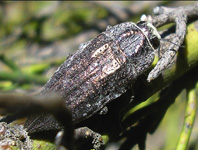Abstract
Geckos of the genus Tropiocolotes are known from Africa through the Middle East to Iran and currently include ten recognized species. Recently Tropiocolotes naybandensis was described from Iran based on morphological data. Here, we confirm the taxonomic status of this species using both molecular and morphological data, and compare it with other populations of Tropiocolotes from Iran. A distinct new clade with high node support from southern Iran shows high genetic divergence from the clade of T. naybandensis and T. steudneri from Africa. Based on morphological examinations, three meristic characters differentiate the two clades: (1) number of gulars; (2) number of subdigital lamellae under first toe; (3) number of postmental scales. Data from two mtDNA genes (16S rRNA and COI) indicate mean genetic divergences for 16S and COI between T. naybandensis and a population from Bandar-e Lengeh of 3.8% and 6.2%, respectively. In addition, the genetic divergences between these two groups and a sample of T. steudneri from Egypt are 10.8% and 10.1% for 16S and 18% and 16.7% for COI, respectively. We thus confirm the specific status of T. naybandensis and present evidence for the existence of a new species level taxon of Tropiocolotes in south Iran.
References
Anderson, S.C. (1999) The Lizards of Iran. Society for the Study of Amphibians and Reptiles, Ithaca, New York, vii + 442 pp., 25 pls.
Bauer, A.M., Masroor, R., Titus-McQuillan, J., Heinicke, M.P., Daza, J.D. & Jackman, T.R. (2013) A preliminary phylogeny of the Palearctic naked-toed geckos (Reptilia: Squamata: Gekkonidae) with taxonomic implications. Zootaxa, 3599 (4), 301–324.
http://dx.doi.org/10.11646/zootaxa.3599.4.1
Dakhteh, S.M.H., Anderson, S.C. & Kami, H.G.H. (2007) Stenodactylus khobarensis (Haas, 1957): An addition to the Iranian herpetofauna. Russian Journal of Herpetology, 14, 229–231.
Hall, T.A. (1999) BioEdit: a user-friendly biological sequence alignment editor and analysis program for Windows 95/98/NT. Nucleic Acids Symposium Series, 41, 95–98.
Kabir, S., Shahriar, M., Kabir, A.H. & Uddin, M.G. (2012) High salt SDS-based method for the direct extraction of genomic DNA from three different Gram-negative organisms. The CDR Journal, 1, 1–64.
Krause, V., Ahmadzadeh, F., Moazeni, M., Wagner, P. & Wilms, T.M. (2013) A new species of the genus Tropiocolotes Peters, 1880 from western Iran (Squamata: Sauria: Gekkonidae). Zootaxa, 3716 (1), 22–38.
https://doi.org/10.11646/zootaxa.3716.1.2Kumazawa, Y., Miura, S., Yamada, C. & Hashiguchi, Y. (2014) Gene rearrangements in gekkonid mitochondrial genomes with shuffling, loss, and reassignment of tRNA genes. BMC Genomics, 15, 930.
https://doi.org/10.1186/1471-2164-15-930
Lambeck, K. (1996) Shoreline reconstruction for the Persian Gulf since the last glacial maximum. Earth Planet Scientific Letters, 142, 43–57.
https://doi.org/10.1016/0012-821X(96)00069-6Posada, D. & Crandall, K.A. (1998) Modeltest: testing the model of DNA substitution. Bioinformatics, 14, 817–818.
https://doi.org/10.1093/bioinformatics/14.9.817Ronquist, F. & Huelsenbeck, J.P. (2003) MrBayes 3: Bayesian phylogenetic inference under mixed models. Bioinformatics, 19, 1572–1574.
https://doi.org/10.1093/bioinformatics/btg180Sindaco, R. & Jeremčenko, V.K. (2008) The Reptiles of the Western Palearctic. 1. Annotated Checklist and Distributional Atlas of the Turtles, Crocodiles, Amphisbaenians and Lizards of Europe, North Africa, Middle East and Central Asia. Edizioni Belvedere, Latina, 579 pp.
Šmíd, J., Moravec, J., Kodym, P., Kratochvíl, L., Rastegar-Pouyani, E., Hosseinian Yousefkhani, S.S. & Frynta, D. (2014) Annotated checklist and distribution of the lizards of Iran. Zootaxa, 3855 (1), 1–97.
https://doi.org/10.11646/zootaxa.3855.1.1
Swofford, D.L. (2001) PAUP*. Phylogenetic Analysis Using Parsimony (*and other Methods), Version 4.0b10. Sinauer Associates, Sunderland, Massachusetts.
Szczerbak, N.N. & Golubev, M.L. (1986) Gecko Fauna of the USSR and Adjacent Regions. Nauka Dymka, Kiev, ix + 232 pp, 8. [in Russian]
Tamura, K., Stecher, G., Peterson, D., Filipski, A. & Kumar, S. (2013) MEGA6: molecular evolutionary genetics analysis version 6.0. Molecular Biology and Evolution, 30, 2725–2729.
https://doi.org/10.1093/molbev/mst197
Wilms, T.M., Shobrak, M. & Wagner, P. (2010) A new species of the genus Tropiocolotes from Central Saudi Arabia (Reptilia: Sauria: Gekkonidae). Bonn Zoological Bulletin, 57, 275–280.
Yousofi, S., Rastegar-Pouyani, E. & Hojati, V. (2015) Phylogenetic relationships among populations of Pristurus rupestris Blanford, 1874 (Sauria: Sphaerodactylidae) in southern Iran. Turkish Journal of Zoology, 39, 447–451.
https://doi.org/10.3906/zoo-1403-6

